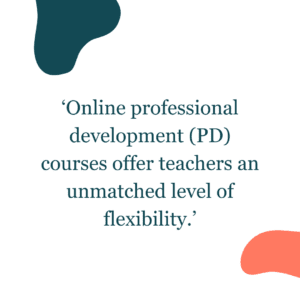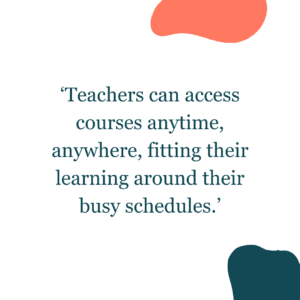PD Courses for Teachers
In today’s rapidly evolving educational landscape, the importance of professional development for teachers cannot be overstated. In particular, as educators strive to adapt to the ever-changing needs of their students, continuous learning becomes a pivotal cornerstone for success. The digital age has supported this through a significant surge in the availability and popularity of online professional development (PD) courses. These virtual platforms offer teachers flexible, accessible, and diverse opportunities to enhance their skills and knowledge. Increasing the accessibility of professional learning not only elevates the quality of instruction but also ensures that educators remain at the forefront of pedagogical innovation. As we delve deeper into this topic, we’ll explore the myriad benefits of PD and the transformative impact of online courses on the teaching profession.

Benefits of Online PD Courses for Teachers
Flexibility and Convenience:
Online professional development (PD) courses offer teachers an unmatched level of flexibility. Unlike traditional in-person PD approaches, these courses allow educators to tailor their learning experiences around their unique schedules. The convenience of accessing materials anytime and anywhere means that teachers can engage in professional growth without the limitations of time or location, making it especially beneficial for those with demanding responsibilities.

Wide Range of Topics and Specializations:
A digital platform with PD courses can present a vast array of subjects and specializations. Educators are no longer confined to a limited set of topics; instead, they can delve into specific areas of interest or broaden their horizons with diverse teaching methodologies. This expansive range ensures that every teacher or school staff member can find a course that aligns with their professional aspirations and curricular needs.
Opportunities for Collaboration and Networking:
Beyond individual growth, online PD courses serve as a hub for global educational interactions. They create spaces where educators from different regions can connect, share insights, and collaborate on projects. This interconnected environment fosters a rich exchange of ideas, allowing teachers to benefit from diverse perspectives and establish valuable professional networks that span across continents.
List of Top Online PD Courses for Teachers
Whilst the learning needs of educators can vary, popular PD courses that are now being accessed online include:
Understanding Student Development and Diversity
Students come from diverse backgrounds, each bringing unique experiences, cultures, and perspectives to the classroom. Recognizing this diversity is crucial for educators. By understanding student development, teachers can tailor their instructional methods to cater to individual needs, ensuring that every student has an equal opportunity to succeed. Embracing diversity not only enriches the learning environment but also fosters mutual respect and understanding among students, laying the foundation for a more inclusive and harmonious classroom.
Teaching STEM
There a major shortages of teachers capable of teaching STEM subjects, leading to schools that are short-staffed, or educators having to rapidly upskill in this area. STEM specific PD courses can help teachers to rapidly learn or refresh their knowledge on key topics, and also build up a toolkit of engagement strategies for their students in these classes.
Orchestrating Whole Classroom Discussion
Classroom discussions are powerful tools for enhancing student engagement and comprehension and these approaches can be learned through online PD sessions. Orchestrating these discussions effectively requires a balance of guidance and freedom. Teachers must pose thought-provoking questions, encourage diverse viewpoints, and facilitate respectful debates. By creating a safe environment where students feel valued and heard, educators can stimulate deeper understanding and critical thinking. Through well-orchestrated discussions, students not only grasp the subject matter but also develop essential communication and analytical skills.
Teaching with Technology
In today’s digital age, programming, AI, graphic design and IT skills have become vital. Introducing technology in primary schools using platforms like Scratch and Minecraft offers young learners a fun and interactive way to grasp foundational concepts. In particular, Scratch’s visual interface allows students to create animations, games, and stories, making learning both enjoyable and educational. By integrating programming early on, educators can equip students with a foundational skill that fosters creativity, problem-solving, and logical thinking, preparing them for future technological challenges.

Education Psychology
Educational psychology delves into how students learn and what factors influence their academic success. PD in this area can equip educators with insights into students’ cognitive, emotional, and social development. By understanding these aspects, teachers can devise strategies that resonate with students’ individual needs, enhancing their learning experience. This knowledge empowers educators to create a conducive learning environment, where students feel understood, motivated, and eager to explore.
Physical Education
Physical education goes beyond just physical fitness; it’s about instilling discipline, teamwork, and perseverance. Effective coaching in physical education requires a blend of various styles and techniques. The key is to adapt the approach based on the students’ needs, the sport, and the desired outcomes. By learning and then employing a mix of techniques, physical educators can nurture talent, foster sportsmanship, and ensure holistic development.
Growth Mindsets for Teachers and Learners
A growth mindset; the belief that abilities can be developed through dedication and hard work, is transformative for both teachers and students. Educators with this mindset are more adaptable, seeking out new teaching methods and continuously improving. Similarly, students with a growth mindset view challenges as opportunities, fostering resilience and a love for learning. By learning these approaches in PD, and then promoting this mindset in the classroom, educators can cultivate an environment where both they and their students thrive, pushing boundaries and achieving excellence.
Core Skills for Teachers
Effective teaching is an art, underpinned by core skills that ensure successful learning outcomes. These skills include clear communication, adaptability, empathy, and subject expertise. Additionally, teachers must master classroom management, curriculum planning, and assessment techniques. By refreshing and learning new skills beyond their university studies, educators can create a structured yet flexible learning environment where students feel supported, engaged, and motivated to achieve their academic potential.
Getting Started with Online Teaching
The digital revolution has reshaped the educational landscape, with online teaching emerging as a dominant trend. Transitioning to this mode requires educators to adapt their teaching methods, harnessing technology to deliver engaging lessons. From choosing the right platform to mastering virtual classroom management, educators must navigate various challenges and PD can support them in this. With the right tools and mindset, online teaching can offer a versatile and effective learning experience, bridging geographical divides and catering to diverse learners.
Frequently Asked Questions: FAQ’s
What qualifies as professional development for teachers?
Professional development for teachers encompasses a wide range of activities and experiences designed to enhance their skills, knowledge, and effectiveness in the classroom. This includes workshops, seminars, conferences, graduate courses, and even peer mentoring. The primary goal is to ensure that teachers remain updated with the latest educational trends, methodologies, and technologies, enabling them to deliver the best possible education to their students.
How do teachers get professional development hours?
Teachers can accumulate professional development hours (PDH) in various ways:
- Workshops and Seminars: Many educational institutions and organizations offer workshops and seminars that count towards PDH. These are often hands-on sessions where teachers can learn new strategies and tools.
- Conferences: Attending educational conferences allows teachers to hear from experts in the field, participate in discussions, and network with peers, all of which can contribute to PDH.
- Graduate Courses: Enrolling in graduate-level courses related to education can also earn teachers PDH. These courses often delve deeper into specific areas of education, offering comprehensive knowledge.
- Online Courses: With the rise of digital learning platforms, many teachers are now turning to online courses to fulfill their PDH requirements. These platforms offer flexibility, allowing teachers to learn at their own pace.
- Peer Mentoring: Some educational institutions recognize peer mentoring as a valid form of professional development. Here, experienced teachers guide and support newer educators, helping them navigate the challenges of the profession.
It’s essential for teachers to check with their school district or governing body to ensure that their chosen method of professional development is recognized and counts towards their PDH.
How does online learning benefit teachers?
Online learning offers several benefits for teachers:
- Flexibility: Teachers can access courses anytime, anywhere, fitting their learning around their busy schedules.
- Diverse Offerings: Online platforms often provide a wide range of courses, allowing teachers to choose topics that are most relevant to their needs and interests.
- Cost-Effective: Many online courses are more affordable than traditional in-person sessions, and some are even offered for free.
- Networking: Digital platforms often have community forums where teachers can connect, share experiences, and learn from peers worldwide.
- Up-to-date Content: Online courses are frequently updated, ensuring that teachers receive the most current information and strategies.

Why Choose Online PD Courses for Teachers?
- Online PD courses provide unparalleled flexibility, allowing educators to learn at their own pace and on their own schedule. Plus, with a vast array of topics available, teachers can tailor their professional development to their specific needs.
- PD courses are designed by educational experts, ensuring you receive up-to-date knowledge and techniques. They not only refine your existing skills but introduce you to innovative teaching methodologies.
- Many online PD courses are accredited and widely recognized, making them a valuable addition to any educator’s resume.




